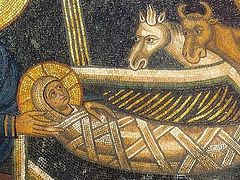The word “angel” means “messenger”, for the angels proclaimed the will of God to people. However, the angels are not only messengers, but also singers, “choir directors” of the Heavenly realm. A song is a harmony of sounds and words, thoughts and feelings. A song is an exclamation from the depths of the heart. For out of the abundance of the heart the mouth speaketh (Mt. 12:34), and out of overabundance of the heart the mouth sings. The angels have blessings in abundance and a fullness of heavenly joy. People sing when they are happy, or when they want to drive away melancholy and regain their joy. The angels sing because they can’t help but sing.
The singing of the angels is the jubilation of Heaven. In Heaven… angels do always behold the face of My Father which is in Heaven (Mt. 18:10). The Angels are always with God. But how can one who is with God not rejoice? Our earthly joys are expressed in singing. But our singing, even the most inspired, is merely a faint shadow of Heavenly joy.
In the Old Testament, the angels did not sing. More precisely, the Lord did not vouchsafe people to hear angelic singing. For how will one hear who is spiritually deaf? How will one who is accustomed, in the words of Mikhail Lermontov, only to “earth’s boring songs”1, understand the harmony of Heaven?
Only to the righteous Job the Long-Suffering did the Lord Himself slightly revealed the mystery: When the morning stars sang together, and all the sons of God shouted for joy (Job 38:7)—the angels met the joy of life, the joy of being, with a wondrous chorus of praise of God. Moreover, Prophet Isaiah contemplated the highest angelic rank—the seraphim, who stood before the majestic throne of God, crying out to each other and saying: Holy, holy, holy, is the Lord of hosts: the whole earth is full of His glory (Is. 6:3).
In the Old Testament, the Angels showed people their unapproachable greatness and superior power. A cherub with a fiery sword threateningly guarded Paradise closed to people (Gen. 3:24). An Angel of the Lord killed 185,000 Assyrians who were besieging Jerusalem in one night (2 Kings 19:35). And even the Archangel Gabriel, who struck the priest Zechariah silent, acted according to the rules of the Old Testament—that was only the threshold of the New Testament.
And it was not until Christ was born, the learned Magi followed the wondrous star, and the illiterate shepherds tended their flocks of meek sheep that angelic singing illuminated our faraway earthly world with the wondrous praise: Glory to God in the highest, and on earth peace, good will toward men (Lk. 2:14). God became man, Heaven came down to earth, and thus people became related to the angels. What is man, that Thou art mindful of him? and the son of man, that Thou visitest him? For Thou hast made him a little lower than the angels, and hast crowned him with glory and honour (Ps. 8:5-6). The whole point of Christian life is for us to be where the angels are now. There is joy in the presence of the angels of God over one sinner that repenteth (Lk. 15:10). That is why in the New Testament angels sing for people who are pure in heart, and the Lord gave people the opportunity to speak with angelic tongues.
But angelic singing is not only an attribute of the holy verses of the Scriptures. Holy Scripture is given to us for life, and angels manifest themselves in the lives of people. St. Ignatius the Godbearer (†107) in a vision contemplated angelic choirs singing of the Holy Trinity in antiphons and after that he introduced antiphonic singing in the Church of Antioch. In the fifth century, during an earthquake in Constantinople, people gathered for common prayer. According to legend, a boy was then lifted to heaven by an invisible force, and when he returned to the earth he said that he had heard angels singing: “Holy God, Holy Mighty, Holy Immortal.” Repeating this prayer, the people added, “have mercy on us,” and the earthquake stopped.
Angelic singing is given us as a consolation, a testimony that our Heavenly patrons are close to us. They are co-participants of the Church services, and they are singers of the wonderful Providence of God.
This is what happened at our St. Nicholas-Ugresh Monastery, connected with St. Pimen of Ugresh. In fact, having arrived at the monastery in 1834, the Venerable Pimen himself heard angelic singing in the Dormition Church. This is reflected in the akathist dedicated to him:
Rejoice, thou who on arriving in Ugresh Monastery didst hear angelic singing.
Rejoice, thou who didst preserve this singing as grace in thy heart until death.
In the late twentieth and early twenty-first centuries the monastery collected information for the canonization of Archimandrite Pimen. A wizened old woman lay in one of the buildings of the monastery, which then belonged to the city. Her name was Olga Ivanovna Zhukova. The monastery was still being filled with brethren, and the buildings were gradually being handed over to it. Just beyond the wall of Olga Ivanovna’s apartment was the cell of Igumen Bartholomew, now the abbot of the St. Nicholas-Ugresh Monastery. Fr. Bartholomew was invited to visit Olga Ivanovna, where heard her confession and gave her Holy Communion. She spoke about her life and shared memories of early childhood, which she then repeated in an audio recording. That information turned out to be extremely important for St. Pimen’s Churchwide veneration. Olga Ivanovna simply shared her childhood impressions, which were engraved in her memory and remained for the rest of her life. As a small child, she often came to St. Pimen’s grave and heard marvelous, amazing, unearthly singing there, but due to her young age she could not explain this properly—she told it to the adults, but they did not believe her. Many decades passed, and Olga Ivanovna became wizened like a mummy. She used to say: “My death is lost.” But once she told the monastery brethren about the angelic singing at St. Pimen’s grave, she soon died. The Lord did not allow her to pass into eternity until she passed on her testimony to those who were able to receive it.
St. Pimen heard angelic singing when he arrived in the St. Nicholas-Ugresh Monastery, and the same singing was heard at his own burial place. Now there is a church dedicated to St. Pimen there—a place where angels are invisibly present and glorify God.
Angelic singing cannot be conveyed using human description, our known musical scales, or earthly phonetics. It is impossible to record it on audio because the singing of angels is not the movement of the vocal cords, not air vibrations that a dictaphone picks up, but a spiritual voice that by the will of God some people are vouchsafed to hear—and even that is very rare. Let’s beware of falsifications, which are a dime a dozen on the Internet.
We recently discussed the theme of angels in our theology courses. Someone mentioned that some angelic singing had allegedly been recorded on Mt. Athos. But on listening to the recording it became clear that that singing had nothing to do with angels. In the recording one could sense human passion and harshness, and an unpleasant aftertaste remained in the soul. How could the sounds of Heaven be like that?
People are given the opportunity to hear angelic singing when they do not expect it. If the singing comes from the Heavenly Kingdom, that cannot leave anyone indifferent or make a bad impression. Paradise so attracts the soul that passions fade away and the soul fills with an unearthly harmony and experiences grace-filled joy and consolation. And if someone hurries to take a dictaphone, he loses contemplation because his attention is wholly focused on earthly things.
When we were discussing this topic, one of our listeners, Elena, decided to share a story from her life. She had not told anyone about it for many years, and only the subject raised at the lecture prompted her to reveal what had happened to her. In 2008, she went with her thirteen-year-old son Nikita on a pilgrimage trip to Mt. Sinai. Many such trips are organized nowadays, and their goal is to visit, among other holy sites, the summit of Mt. Sinai, where according to tradition God appeared to Moses. Now the Holy Trinity Church is there.
Some Bedouins accompanying the group provided camels for all the members to climb the mountain. When Elena mounted a camel, she suddenly had an allergic reaction. She had been suffering from allergies for many years and even acquired allergy-induced asthma. Seeing her condition, other members of the group said discontentedly, “Why didn’t you bring any medicine with you?” She made excuses: “I didn’t know I had an allergy to camels.” Elena was gasping for breath and coughing. It was becoming impossible to ride the camel anymore, and she decided to walk to the top of the mountain with her son, while the rest of the group rode camels along a different path suitable for animals.
Soon it got dark, and the bottomless sky stretched out its wide dome. But, as if in spite of all this beauty and silence of the endless sky, the allergic reaction was not about to stop, tormenting Elena as she walked. When they were halfway to the summit, Elena felt that she could no longer walk. She stopped and said to her son, “Son, I can’t bear it anymore. Go up alone, and I’ll somehow walk down slowly.” When she had resigned herself to the situation, Nikita suddenly said, “Mom, we’re nearly there! The church isn’t far. Can’t you hear the singing?” She listened attentively and could hear it too. The singing was clearly related to the church service, but was very special—though later Elena could not remember any words. The singing drew them to itself, instilled warmth and peace in their souls. Their hearts so wanted to be where this singing was that Elena and her son immediately picked up their pace, as if there were no fatigue. She did not even notice that the allergic reaction was completely gone. The church was not as close as they had thought, but the wonderful singing poured strength into them. Soon they reached the church—ahead of the group that was climbing on camels! They so wanted to be where the singing was coming from that they literally flew into the church and were stunned by the silence that reigned there! There was no service, and the singing could no longer be heard!
What remained in Elena’s memory was not the healing of her allergic reaction, but above all a paradisiacal song, in comparison with which earthly joys and pleasures fade and which testifies only to one thing: man’s happiness is only in God.
Why a sign is given to one person and not another is an intractable question. But one thing is true—in any church there are angels, they sing praises to God and become close to humble souls. When we enter the sacred space of an Orthodox church, let’s remember that here too angels sing: Glory to God in the highest, and on earth peace, good will toward men.




